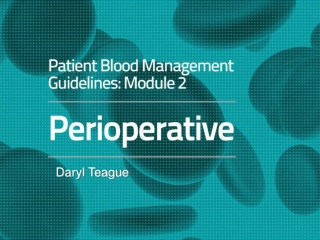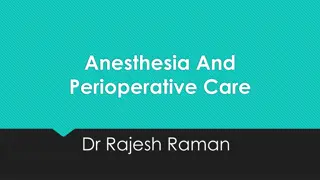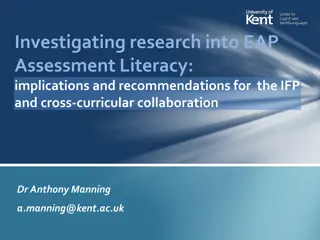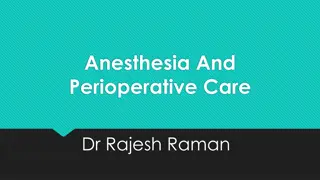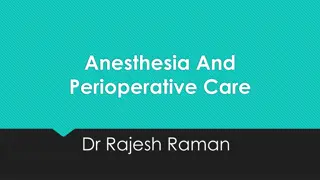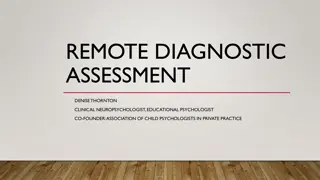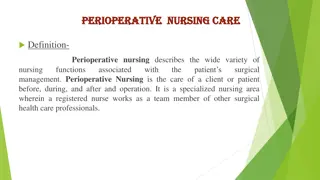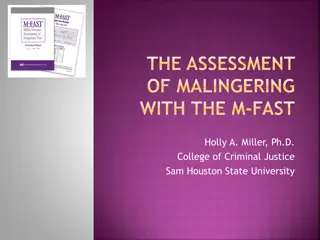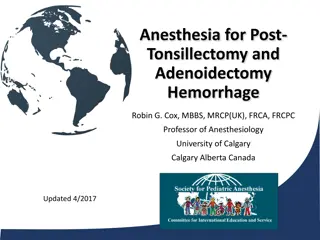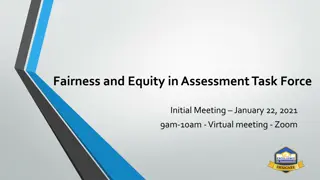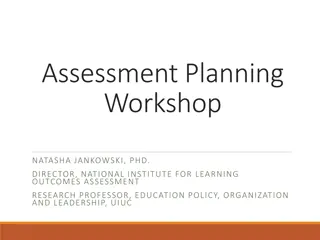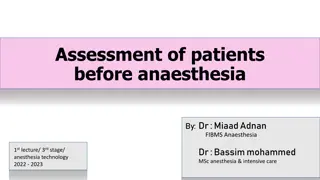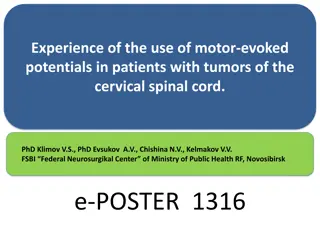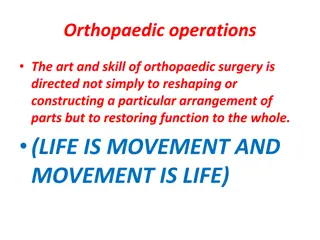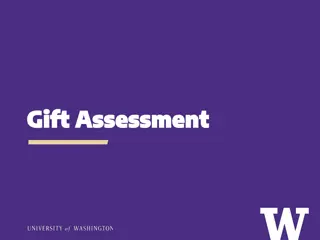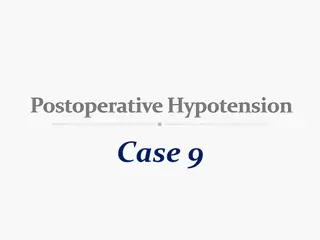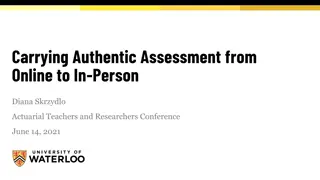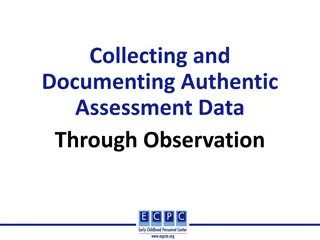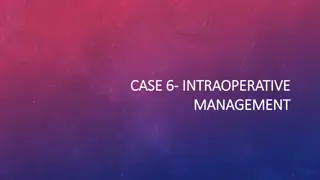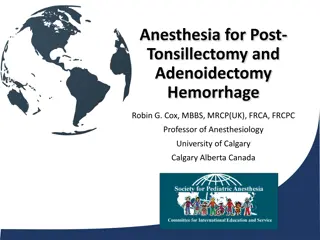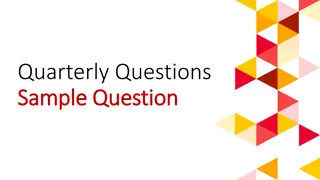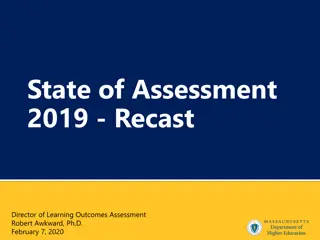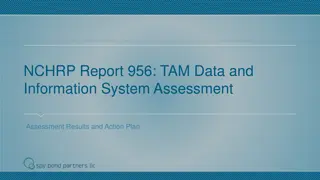Perioperative Patient Blood Management
The Patient Blood Management (PBM) Program implemented by Orthopaedic Surgeon Daryl Teague to provide optimal care for Ruby, a 73-year-old with diabetes and high blood pressure, who needs a new hip joint. The program includes preoperative anemia assessment, intraoperative blood conservation, and pos
2 views • 20 slides
Sheffield Early Help Assessment Form Update and Integration with Extended Support Plan
Sheffield has introduced an updated Early Help Assessment form to streamline the assessment process within the Early Help System. This new form combines the Early Help Assessment with the Extended Support Plan, aligning various assessment tools and referral forms into one comprehensive document. The
5 views • 22 slides
Anesthesia and Perioperative Care - Comprehensive Guide by Dr. Rajesh Raman
This detailed guide by Dr. Rajesh Raman covers various aspects of anesthesia and perioperative care, including preoperative assessment and optimization, intraoperative care, postoperative care, perioperative risk assessment, risk due to surgery, medication management, and routine investigations for
2 views • 31 slides
Enhancing Language Learning Through Peer Assessment
Explore the benefits of peer assessment as a valuable tool for language learning, comparing it with self-assessment. Discover the components and challenges of self-assessment, along with the potential of peer assessment to improve accuracy and promote self-regulation. Gain insights into what peer as
3 views • 29 slides
Investigating EAP Assessment Literacy for IFP and Cross-Curricular Collaboration
This research project by Dr. Anthony Manning explores the implications and recommendations regarding EAP assessment literacy for the International Foundation Program (IFP) and cross-curricular collaboration. The study delves into defining assessment literacy, research objectives, relevant literature
3 views • 26 slides
Anesthesia And Perioperative Care
This detailed guide covers key aspects of anesthesia and perioperative care, emphasizing preoperative assessment, optimization, intraoperative management, and postoperative care. Topics include perioperative risk assessment, risk scoring, routine investigations, and medication management strategies
1 views • 31 slides
Anesthesia and Perioperative Care by Dr. Rajesh Raman
This informative content covers various aspects of anesthesia and perioperative care including preoperative assessment, optimization, intraoperative and postoperative care, perioperative risk assessment, risk due to surgery, risk scores for major cardiac events, routine investigations for patients,
0 views • 31 slides
Overview of DSW End Point Assessment Team Leader Level 3
DSW End Point Assessment Team Leader Level 3 provides a clear understanding of the assessment process, ensuring individuals comprehend why and when it occurs, responsibilities involved, and how DSW supports them. It covers topics such as what End Point Assessment entails, assessment design and deliv
1 views • 18 slides
Anesthetic Management of Bronchoscopy for Airway Foreign Body
This article discusses the anesthetic management of bronchoscopy for airway foreign body, including presentation, preoperative work-up, intraoperative management, and postoperative care. It highlights the incidence of foreign body inhalation, immediate and delayed presentations, findings on chest X-
2 views • 32 slides
Remote Diagnostic Assessment Explained by Clinical Neuropsychologist
Remote diagnostic assessment, also known as telepractice, allows assessors and individuals to be in separate locations while using internet-connected devices for assessment sessions. A facilitator may be present for support, and precautions are taken to ensure confidentiality and integrity of the as
3 views • 13 slides
Essential Aspects of Perioperative Nursing Care
Perioperative nursing involves comprehensive care for patients before, during, and after surgery. It encompasses various phases such as preoperative, intraoperative, and postoperative care, with a focus on ensuring the patient's well-being and safety throughout the surgical process. Key goals includ
0 views • 33 slides
Understanding Malingering: Assessment and Implications
Malingering, intentional fabrication of symptoms for external gain, presents challenges in assessment. The M-FAST (Miller Forensic Assessment of Symptoms Test) offers a detailed approach for identifying malingering behaviors. Research suggests relying solely on clinical judgment may lead to inaccura
5 views • 24 slides
Autologous Blood Donation: Advantages, Types, and Considerations
Autologous blood donation involves collecting and storing a patient's own blood for later transfusion, offering numerous advantages such as reducing the risk of transfusion-transmitted diseases and providing compatible blood for patients with allo-antibodies. However, it also comes with concerns lik
1 views • 46 slides
Anesthesia Management for Post-Tonsillectomy Hemorrhage in Children
This article discusses the epidemiology, causes, and anesthesia management of post-tonsillectomy and adenoidectomy hemorrhage in children. It covers the rates of hemorrhage following these procedures, including primary and secondary occurrences, mortality statistics, and specific factors contributin
0 views • 31 slides
Fairness and Equity in Assessment Task Force Meeting Overview
The Fairness and Equity in Assessment Task Force is committed to establishing guidelines to ensure fairness in assessment processes at the University of Florida. The task force members are tasked with developing models and guidelines for faculty and staff to promote equitable assessment practices. R
1 views • 29 slides
Lancashire Assessment and Planning Framework: Enhancing Child Welfare Through Comprehensive Assessments
The Lancashire Assessment and Planning Framework outlines the approach for assessing and managing child welfare cases in Lancashire. It emphasizes the importance of effective assessment, planning, and interventions to meet the needs of children and families. The framework integrates tools like the C
0 views • 13 slides
Understanding Assessment in Medical Education
Exploring the concepts of assessment in medical education, including defining assessment, types of assessment, reliability, validity, and aligning assessment methods with intended learning outcomes. The importance of constructive alignment and the impact of assessment on learning outcomes are also d
1 views • 12 slides
Assessment Matters in Sociology: Enhancing Learning Through Evaluation
Explore the significance of assessment in sociology education, focusing on key questions to evaluate current assessment procedures, review individual course assessments, and develop strategies to enhance student learning outcomes. Delve into the centrality of assessment in the learning process, with
1 views • 15 slides
Insights into Managing Assessment in the Classroom by Assessment Research Group
Explore the importance of standards and assessment in education through the lens of the Assessment Research Group. Gain valuable perspectives on curriculum delivery, understanding the assessment system, learner assumptions, task parameters, and more. Discover how language, structure, and agency play
2 views • 25 slides
Workshop on Assessment Planning by Dr. Natasha Jankowski
Dr. Natasha Jankowski, Director of the National Institute for Learning Outcomes Assessment, conducts a workshop focusing on effective use of assessment data to enhance undergraduate education. The workshop covers areas like evaluating assessment plans, program learning outcomes, and assessment rubri
0 views • 30 slides
Enhancing Understanding through Assessment in Educational Design Workshop
Learn and collaborate on assessment practices in education design at the "Understanding by Design Assessment Focus" workshop. The agenda includes sessions on summative and formative assessment, feedback, reporting, and more. Engage in activities like generating questions, finding destination partner
1 views • 76 slides
Preoperative Assessment of Patients for Anesthesia: Guidelines and Protocols
Efficient preoperative assessment is crucial to ensure patient safety and optimal outcomes during anesthesia administration. This process involves thorough history taking, physical examination, evaluation of medical conditions, and planning for anesthesia techniques. The assessment helps in identify
0 views • 46 slides
Institutional Assessment Planning Workshop Feedback and Insights
Feedback and insights from a recent institutional assessment planning workshop led by Dr. Mark Nicholas at FSU S. Warren Conference Center & Inn. Participants provided feedback on the usefulness of the content, presenter knowledge, ability to develop assessment plans, post-training assessment knowle
1 views • 9 slides
Understanding Higher Education Assessment: The Complete Guide
Higher education assessment involves a systematic process of collecting, reviewing, and utilizing information to improve student learning and development. This guide covers the assessment cycle, learning outcomes, the mission behind assessment in higher education, what assessment is and is not, reas
1 views • 36 slides
Use of Motor-Evoked Potentials in Cervical Spinal Cord Tumor Patients
Neurophysiological intraoperative monitoring using motor-evoked potentials is crucial in evaluating spinal cord function during surgery for cervical spinal cord tumors. This study examines the relationship between neurological changes and intraoperative motor-evoked potentials in patients, aiming to
0 views • 8 slides
The Art of Orthopaedic Surgery: A Comprehensive Guide
Orthopaedic surgery involves intricate planning, precise execution, and specialized equipment to restore function to the body. From preoperative assessments to intraoperative techniques like radiography and magnification, this field aims to enhance mobility and quality of life. The use of tourniquet
0 views • 22 slides
Understanding Gift Assessment Process at University of Washington
The Gift Assessment Process at University of Washington involves applying a 5% assessment to select current-use gifts over $1,000 and under $5 million. This assessment supports the university's advancement efforts and institutional priorities by transferring 5% of eligible contributions to the Provo
1 views • 5 slides
Overview of Environmental Impact Assessment and Strategic Environmental Assessment Directives
Environmental Impact Assessment (EIA) and Strategic Environmental Assessment (SEA) play crucial roles in evaluating the impact of planned activities on the environment. This content delves into the concept, origins, development, and key elements of environmental assessment, discussing the legal fram
2 views • 35 slides
Institutional Assessment and Effectiveness Workshop Achievements at SUNY Oneonta
The Office of Institutional Assessment and Effectiveness at SUNY Oneonta has made significant progress in developing assessment protocols and processes, leading to a culture of assessment. This includes completing planning and assessment cycles, establishing objectives and procedures, and aligning u
1 views • 16 slides
Oregon Department of Education Assessment and Accountability Resources
Access important information on assessments, accountability, and reporting from the Oregon Department of Education. Find resources on updating assessment records, accessing student scores, and staying informed about assessment requirements for the 2023-24 academic year. Explore links for assessment
0 views • 55 slides
Oregon Department of Education - Assessment Resources and Updates
Explore the Assessment Record Updating Application (ARUA), Accountability Warehouse Extract (AWE), Secure Assessment Reports, and other important tools and information provided by the Oregon Department of Education for assessment data owners, analysts, and partners. Access links for assessment admin
0 views • 54 slides
Postoperative Hypotension: Management and Recovery Strategies
In a case of postoperative hypotension following a transurethral prostatectomy under spinal anesthesia, a 78-year-old patient presented with agitation and shivering in the PACU. Vital signs and pain scores were monitored, showing a blood pressure of 89/40, heart rate of 85/min, and respiratory rate
0 views • 16 slides
Postoperative Hypotension in a Diabetic and Hypertensive Patient Undergoing Prostatectomy
A 78-year-old patient with a history of diabetes and hypertension developed hypotension post-transurethral prostatectomy under spinal anesthesia. Upon arrival in the postoperative care unit, the patient was agitated and shivering with a blood pressure of 89/40. The routine monitoring in PACU include
0 views • 11 slides
Enhancing Teaching Assessment for Actuarial Education
Exploring the transition of assessment practices from online to in-person settings, this presentation by Diana Skrzydlo at the Actuarial Teachers and Researchers Conference delves into the purpose of assessment, key principles, and activities for effective evaluation. Discover insights on diagnostic
0 views • 10 slides
Authentic Assessment through Systematic Observation: Best Practices
Explore the process of authentic assessment through systematic observation in early childhood education. Learn about collecting, documenting, and interpreting assessment data using evidence-based practices and technology. Discover the importance of working collaboratively with families and professio
0 views • 53 slides
Preoperative Assessment and Management for Squint Surgery in a 4-Year-Old Male Patient
Assessing a 4-year-old male patient booked for right eye squint surgery involves evaluating his preoperative risks, conducting necessary tests, assessing medication needs, and ensuring fasting protocols are followed. Key aspects include reviewing medical history, conducting physical examinations, ad
0 views • 14 slides
Anesthesia Management for Post-Tonsillectomy and Adenoidectomy Hemorrhage
This content provides insights into the epidemiology of post-tonsillectomy and adenoidectomy hemorrhage in children, including rates and causes. It outlines a plan for anesthesia management, covering preoperative, intraoperative, and postoperative aspects. Mortality statistics after tonsillectomy an
0 views • 31 slides
Managing Intraoperative Floppy Iris Syndrome in Cataract Surgery
Effective management of intraoperative floppy iris syndrome in cataract surgery involves specific maneuvers such as reducing aspiration flow rate, using mechanical iris expansion devices, and avoiding large or posterior incisions. This condition is characterized by progressive pupil constriction, ir
0 views • 6 slides
Assessment Practices in Higher Education Institutions
Dive into the state of assessment for the year 2019, featuring insights on hosting assessment days, establishment of assessment committees, implementation of institutional and program learning outcomes, appointment of a Director of Assessment, compensation for faculty members focusing on assessment,
0 views • 8 slides
NCHRP Report 956 TAM Data and Information System Assessment
This content provides an overview of NCHRP Report 956 focusing on the TAM data and information system assessment results and action plan. It includes details on assessment outcomes, recommendations, implementation action plans, and tools for self-assessment and improvement methodology. The content a
0 views • 21 slides
